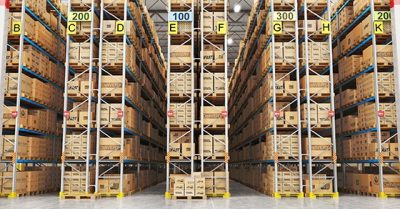
This year’s UKWA National Conference was an opportunity to discuss several key challenges of the Logistics industry during 2 days in Chester, UK.
The main subject of the conference was: “Transforming Logistics for the Digital World”.
Peter Ward, Chief Executive – UKWA, introducing the conference, stressed the fast-changing environment within the industry:
- New demands on Logistics
- Global sourcing for global markets
- Worldwide shortage of skilled logistics manpower
- Multiple routes to consumer
- Unprecedented call for agility and flexibility of warehousing-distribution
As a matter of fact, logistics service providers have to embrace on-going change, think more international and enter the digital world to address these challenges. This statement was confirmed by a global economic outlook presented by Walter Boettcher, Director of Research & Forecasting, Colliers International describing that the only certainty was an on-going worldwide uncertainty (trade war between the US & China, Brexit, geopolitical issues) that may impact the GDP global growth.
“As the value of information about goods and services eclipses the value of those goods and services”, the panel discussion on digital supply chain strategies was promising: “the digital imperative” as described by Natasha Tyrrell and Aloke Kapur (Bearing Point) has become a reality with Industry 4.0, a strategic high-tech project from the German government in 2010 (also known as the 4th Industrial Revolution).
Most of the discussion highlighted the challenges businesses experience to design and implement a digital strategy: why focusing on digital? Increased expectations from customers that are digital, new digital competitors disrupting traditional industry models as they engage the market in a different way or the need to digitise operations to increase productivity and ensure process and people agility: the Logistics industry has to transform itself to remain competitive and innovative on the market especially in the wake of an e-commerce on-going thrive (as rightly described by Gavin Masters, Industry Principal e-commerce, Maginus).
But it was obvious during discussions with delegates how difficult it is for businesses to build an efficient digital strategy. Choices have to be made between:
- Business optimisation – improved productivity, improved customer experience, and,
- Business transformation – new business model, new product and services
Among 12 key digital technologies, IoT, autonomous vehicles and machine learning & AI are the most important ones for logistics. Such technologies shall support end to end optimisation with connected supply chain (predictive supply chain, integrated planning and visibility).
One main question was the access to technology funding by logistics service providers. Questions from the audience raised the issue of low margin businesses and the challenge to implement a digital strategy. And if logistics is the new retail, Amazon was in several discussions without being named as the e-commerce giant is creating so much disruption on the logistics market. Logistics service providers know they need to do something when it comes to digital.
However, to the question: “do you already have a digital strategy?”, 64% of the audience answered “No”. And despite 44% said it was on the 2019 agenda, 33% still do not see the development of a digital strategy “as a priority”.
Time to change and to look for more innovation?
However, not only digital opportunities were discussed: Michelle Watson, CEO Cyber Intelligent Partners and Claire Russel, Strategic Development Director, Perry Appleton, facilitated a panel discussion on “managing cyber risk in the digital world”: we learned there are 2 categories of companies, the ones who were hacked, and the other who will be soon! Nearly 70% of UK firms were hit by a cyber attack in 2018, resulting to a financial loss for 67% of them. Several tactics were shown and we can’t wait to attend a dedicated conference on this subject in May 2019.
And what about the “unprecedented call for agility and flexibility of warehousing-distribution” as rightly pointed out by Peter Ward? Kevin Mofid from Savills, highlighted the key trends of the warehousing market pointing out the market as doubled since 2006/2007 in the UK, the supply is increasing (meaning more choice on the market). It seems the pre-Brexit current stock piling does not impact so much the market. This was confirmed by a poll within the audience showing that the biggest property concern was the availability of labour (32%) compared to 27% related to the availability of warehouse space in the right location.
Manpower. Shortage of logistics skilled labour. It was rightly discussed the second day with Debbie Shandley, CEO – the Real Apprenticeship Company and Peter Jones, Managing Director, Logistics Learning Alliance. Interestingly, we learned £400m of employer levy was underspend for the first year: 30-40% only of the levy funding are used by employers. Several projects of Virtual Academy and e-learning programs were described which are key to staff development.
However, one main question – partially answered – was: how do we make this industry more attractive to be able to develop people?
Especially in the wake of Brexit. Yes! Last but not least, the B… word was pronounced in a panel session facilitated by Tokema’s MD, Pierre Liguori: Tony Thomas, Deputy Director, Cross Government Border Delivery Board, made an update of the government Brexit preparation. He emphasized the challenges to address all the subjects given the current uncertainty on what the final deal will be. Barbara Scott, Proprietor Customs Associates, described the different customs statuses and procedures that shall come into force post-Brexit and how businesses could prepare themselves. Pierre Liguori finally described the level of preparation of the EU border countries especially for no deal: the port of Rotterdam prepared for no-deal Brexit for a year, hired and trained 1,000+ customs officers, most of them in Eastern Europe (they were given crash courses in Dutch). Although they believe there will be initial disruptions they are confident to efficiently manage this big change. It was an interesting comparison to make with France and especially Calais, where France authorities committed to hire 700+ customs officers and veterinarians and make an EUR 6 million investment to create parking zones of 200 trucks to facilitate documents checks and sanitary inspections especially for food and agriculture products. The mayor of Calais claim “We are very far from having hired on time the resources we need to face no deal Brexit”. Ironically, French customs officers went on unlimited strike the day before the UKWA conference. Perfect timing to discuss contingency plans: asked if they have a plan, very few participants answered yes…


